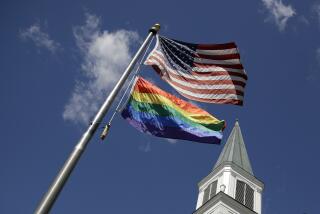Analysis: Feminism and Mormon doctrine collide and lead to rare excommunication
- Share via
Kate Kelly, the face of the latest wave of feminist demands on the Mormon church, said she is unlikely to seek rebaptism in the Church of Jesus Christ of Latter-day Saints any time soon, after she was formally excommunicated on Monday.
“I’ve done nothing wrong and have nothing to repent,” Kelly said in an interview with the Salt Lake Tribune, published in Utah, where the church is based. “Once the church changes to be a more inclusive place and once women are ordained, that’s a place I’d feel welcome.”
Kelly said she will likely seek to appeal her ouster to a higher church authority, but the issue she represents -– inclusion of women on a equal clerical standing with men -- is one with which the Mormon church, as well as other religions, have long grappled.
Her case also highlights the issue of excommunication itself -- essentially separating the individual from the body of her society. It sounds like a harsh penalty, but it has a long and glorious history in the annals of religion as well as in secular society.
All societies define their membership and operating rules, including those for separating individuals from the pack. If you think this is a phenomenon reserved for religions, just visit any office cooler after a big sporting event and watch the person who rooted for the wrong side being ostracized. American society has even developed a genre of reality television around one’s peers voting someone off of the island. It is no accident one show is called “Survivor.”
When it comes to religions, however, many have institutionalized ways of defining and including their members and casting out those who fail to make the grade or have thumbed their noses at the prevailing dogma.
Some Protestants sects call it shunning, barring all social contact with the miscreant. Judaism had a form of such censure as well, though the practice has gone by the wayside as Jews were allowed to move out of legal ghettos and the religion divided among different branches. Roman Catholics have a history of excommunication going back to the 1st century and include a whole slew of kings before, during and after the Protestant Reformation: One side’s excommunicated heretics are another side’s revered leaders.
Over the weekend, Pope Francis declared organized crime in Italy to be excommunicated from the Roman Catholic Church: “Those who in their life have gone along the evil ways, as in the case of the Mafia, they are not with God, they are excommunicated,” he said on a visit to Calabria. But that proclamation lacked the formal heft of the leader of the church speaking about doctrine and probably was meant to be more of a warning to hoodlums.
Like all religions, Mormon excommunications, especially for apostasy, or the abandoning of a religious belief, can be complicated.
Last year, Kelly helped found Ordain Women, a group that seeks gender equality and women’s ordination to the priesthood. A former Mormon missionary, she rose to national prominence leading demonstrations at the church’s semiannual conferences at Temple Square in Salt Lake City.
Women do hold leadership positions in the church, which has about 15 million members worldwide, but the priesthood is closed to females, spokesman Eric Hawkins said in an e-mail to the Los Angeles Times. “The pattern of ordaining men to the priesthood was established by Christ in His Church, and is followed in His restored Church today,” he stated.
The national church does not have statistics on how many people have been excommunicated, Hawkins said, since discipline is usually initiated at the local organizational level known as stakes. It was a stake in Virginia that met on Sunday in Kelly’s case and decided to excommunicate her.
In his letter to Kelly, Bishop Mark Harrison said it was how she promoted her views that created the problems for church elders. The letter was released by Kelly’s allies.
“The difficulty, Sister Kelly, is not that you say you have questions or even that you believe that women should receive the priesthood. The problem is that you have persisted in an aggressive effort to persuade other church members to your point of view and that your course of action has threatened to erode the faith of others,” Harrison wrote. “You are entitled to your views, but you are not entitled to promote them and proselyte others to them while remaining in full fellowship in the church.”
As part of her excommunication, Kelly, a human rights lawyer, will be prohibited from wearing Mormon temple garments, hold positions in church or give talks during services, among other things. After one year, the church will consider readmitting her through rebaptism, if she shows true repentance.
Excommunication is rare among Mormons, especially for apostasy. The last case that became well-known was in September 1993, when a group of six intellectuals published works, including on the role of women, that the church considered to be against Mormon doctrine or critical of the church’s leadership. Five were excommunicated and one received a lesser punishment.
Some have since returned to the fold.
Follow @latimesmuskal for national news.
More to Read
Sign up for Essential California
The most important California stories and recommendations in your inbox every morning.
You may occasionally receive promotional content from the Los Angeles Times.














